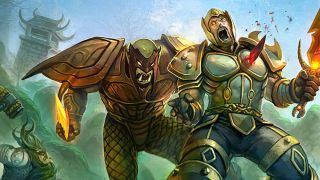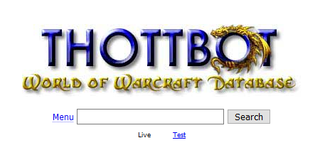The most infamous MMO players of all time
Famous or infamous, these players still have their stories told years or decades after becoming forum legend.
Just to get it out of the way: everyone already knows about Leeroy.
MMOs are at their best when they're a social experiment. Yes, I enjoy a well-crafted raid boss, the easy camaraderie of a dungeon run, or the brain-melting possibilities of enormous talent trees. But nothing compares to the wondrous feats of player innovation reported in subreddits and gaming forums. The oral tradition of MMOs has consecrated so many acts of hilarious, community-driven infamy.
Who could forget Everquest's unkillable dragon? Or the corrupted blood of Zul'Gurub? Or the last stand of Asheron's Call? All of these titanic heirlooms of MMO history were created by people who wanted to twist the social fabric of their favorite video games, bringing a little bit of earthly autonomy into a parallel universe. That's the magic of the genre. We are elves, dwarves, orcs and gnomes, but unmistakably human after all.
I wanted to highlight that humanity with a collection of the most legendary players in the history of MMOs. Gamers who broke the rules and tilted a community on its axis. Their legends take many different forms: Below you'll read about ferocious griefers, uncompromising capitalists, and genius self-promoters who've, collectively, given their inherited worlds the extra color they desperately need. Many of these stories are pulled from the earliest era of MMOs because in 2022, our physical and digital avatars rarely feel wholly distinct anymore. We're simply Too Online (in 2005, the most famous World of Warcraft players weren't live on Twitch). An air of delectable mystery may be gone now, but the tales have only grown more magisterial in that absence. Let's keep the energy alive, for as long as we can.
Angwe, menace of Menethil Harbor (World of Warcraft)

Some people play World of Warcraft to venture deep into the mystic wildlands of Azeroth, some want to pledge their swords to the Horde or Alliance, others simply want to make a lot of noobs cry out in bitter frustration. Angwe played a rogue back in WoW's radical early years and spent much of his time in-game skulking around Menethil Harbor, a chokepoint that ferried low-level Alliance players between both of the game's massive continents. The lowbies would board the ships, Angwe would pounce and send them to the graveyard. Suddenly their trip became a lot more arduous. His name spread, and suddenly every Alliance fledgling feared the threat of Angwe.
To celebrate his notoriety, Angwe kept a spare Blizzard account active and planted an Alliance mole in the harbor so he could read the complaints his targets were lodging about him in the general chat. (Remember, humans and orcs don't speak the same language or have access to the same discussion channels. That's why you need a spy.) Angwe used to post the highlights of those aggrieved missives to a website that I can no longer find, but do consider reading Steven Messner's profile on the man, the myth, the legend. It's one of those Wild West tales that simply can't exist in the modern MMO ecosystem, where "balance" and "quality-of-life" have taken priority over the dystopian social experiments that used to define the genre. I can only hope Angwe logged back in for Classic, if only for a few more ganks.
The Songbirds, the traveling bards of Hydaelyn (Final Fantasy 14)

By and large, MMOs ask the player to do way too much killing. We play these games to explore the horizons of an unspoiled world with the camaraderie of so many others giving themselves over to the wonder. But how do we actually interact with all that? By beating a few kobolds to death and returning their candles to a man with a glowing question mark over his head, of course.
The biggest gaming news, reviews and hardware deals
Keep up to date with the most important stories and the best deals, as picked by the PC Gamer team.
By the time a player hits the level cap, they've already orchestrated several different genocidal campaigns. That's why I love The Songbirds, one of Final Fantasy 14's more beloved bard bands. Catch them on the streets of Gridania, busking with airtight Coldplay covers, showing us all how much mirth there is to be found when we sheathe the sword for a few seconds. Honestly, if anyone is able to master "Viva La Vida" with digital instruments, they should automatically be rewarded with the latest tier set. You can book The Songbirds right now if you'd like, or check their schedule to attend an upcoming concert.
Grim, PVP celebrity (World of Warcraft)
Everything about Grim's first PvP montage is a time capsule. It's rendered in chunky 360p, pockmarked with a huge swathe of early-00s internet-cafe butt-rock (Dragonforce and Linkin Park!) and mostly takes place on the open frontiers of Azeroth rather than the manicured arenas and battlegrounds that define World of Warcraft's PvP infrastructure today. And yet, I absolutely remember downloading Grim's first montage off of some long-buried forum thread and becoming steadily more enthralled as he demonstrated what was possible with a comprehensive mastery of his rogue's collection of feints, stuns, and ambushes. He sliced through everything in his path, and went viral long before the machinery of retweets and shares lent itself to internet fame.
Today, multiplayer compilations are part of the basic grammar in the gamer-influencer industry. Big ups to Grim. He showed us the way forward.
Rainz, assassin of kings (Ultima Online)

Richard Garriott is traveling through the stars and exploring the depths of the ocean these days, but back in the late '90s, he was one of the first truly eminent game designers. The Ultima series emerged from the roguish, floppy-disk era of computer RPGs, and Garriott—always enthusiastic about new frontiers—happily brought his universe to cyberspace with the creaky, experimental, and still beloved Ultima Online. As always, Garriott's in-game alter ego Lord British made an appearance in Castle Britannia, this time fashioned as an invulnerable NPC despot. That is, of course, until one fateful day during the Ultima Online beta, where a mage named Rainz cast a spell called "fire field" on Lord British's feet. The king shockingly keeled over, and Rainz immediately became the most distinguished player in the game.
This wasn't supposed to happen. Lord British is coded to be invincible. But apparently, after a server crash, Lord British lost his invulnerable flag, giving Rainz one shining opportunity to write his name among the stars. Rainz was eventually banned after he mucked around with exploits, which sounds like a fitting end. An Ultima without Lord British is intrinsically uncanny; it's like if the Joker finally managed to kill Batman or something.
Zezima, the ultimate Runescape whale
Zezima didn't attain his legendary status from a high-profile coup or a multitude of imaginative griefing incidents. No, he just played a lot of Runescape.
Zezima was the first player to attain a 99 skill in Slayer—the Runescape metric that tracks your adeptness at killing monsters, which is pretty impressive considering the huge assembly of players who had access to Jagex's browser-based masterpiece. But honestly, that threshold pales in comparison to the most mind-boggling achievement on Zezima's resume; the man accrued one billion experience across his time logged on. Yes, billion. With a "B." The vast majority of my Runescape playing career was spent in my middle school's computer lab, so I can't even fathom the grind that Zezima put himself through to reach a Jeff Bezos-sized in-game portfolio.
Jagex has recognized that legacy; in 2013, the studio rewarded Zezima with a Lifetime Achievement award.
Arenis, master spy (EVE Online)

There's a hacky old adage that Eve Online is the best game you'll never play. I fall right into that stereotype. I've spent maybe 20 minutes exploring EVE's universe, and the hellish combination of spreadsheets and asteroid mining that seems to comprise much of the gameplay has never urged me to try again. So many gamers consume Eve Online as detached spectators of the strange, high-stakes dramatic cycles the software is capable of creating out of thin air. Chief among them? The saga of Arenis, who toppled one of the most powerful corporations in the galaxy.
If you've never read Tom Francis' longform recap of the gambit, I highly encourage you to take a look. But to break it down succinctly, a shadowy figure in EVE Online hired the services of an elite criminal organization called The Guiding Hand Social Club to eliminate a player named Mirial—who happened to be CEO of Ubiqua Seraph, then one of the most powerful corporations in the MMO. Over the course of 10 months, a top agent named Arenis wormed her way up through the Ubiqua Seraph hierarchy, to the point of gaining the unquestioned trust of Mirial. That agent lured Mirial out into a remote corner of space where the trap was finally sprung. Scores of Guiding Hand ships materialized from the shadows, destroying Mirial's incredibly expensive ship, bringing her body back to the broker as proof of the deed.
In total, the Guiding Hand Social Club pilfered enough ISK, EVE's in-game currency, to equal $16,500. It reinforces one of the fundamental truths of online gaming; you never truly know who you're speaking too across the void.
Anshe Chung, the mogul (Second Life)

Anshe Chung is the only player-character on this list to be immortalized on the cover of BusinessWeek. Chung, the alias of Ailin Graef, was always fascinated by the financial prospects of MMOs, which made her a perfect pairing with Second Life's grand metaversal experiment. She started selling custom animations to players, pocketing the virtual currency, and reinvesting it into the real estate available throughout Second Life's ethereal plains. Voila, gaming had its first self-made millionaire, 15 years before Mark Zuckerberg and Tim Sweeney started cashing in on their specious web3 plans.
They all owe Chung backtax, as far as I'm concerned.
Aftathott, the archivist (Everquest)

Who knows where MMOs would be without the hard work of Bill "Aftathott" Dyess. The man came to the scene through Everquest, and started up a website called Thottbot which aggregated any news it could find about that first boom period for the genre. (Dark Age of Camelot, Asheron's Call, and so on.) But when World of Warcraft came out, Dyess morphed his site into a database for every minute doodad in Azeroth, and it quickly became a trusty companion for anyone taking their first tentative steps into Durotar. Need to pin down Mankrik's Wife? Type the quest name into the search engine, learn the coordinates, so you will never have to be roasted in general chat ever again.
Thottbot laid the foundations for an endless stream of fansites and quality-of-life mods for the next two decades. Seriously: without him I might have never gotten past level 10.

Luke Winkie is a freelance journalist and contributor to many publications, including PC Gamer, The New York Times, Gawker, Slate, and Mel Magazine. In between bouts of writing about Hearthstone, World of Warcraft and Twitch culture here on PC Gamer, Luke also publishes the newsletter On Posting. As a self-described "chronic poster," Luke has "spent hours deep-scrolling through surreptitious Likes tabs to uncover the root of intra-publication beef and broken down quote-tweet animosity like it’s Super Bowl tape." When he graduated from journalism school, he had no idea how bad it was going to get.
Most Popular


